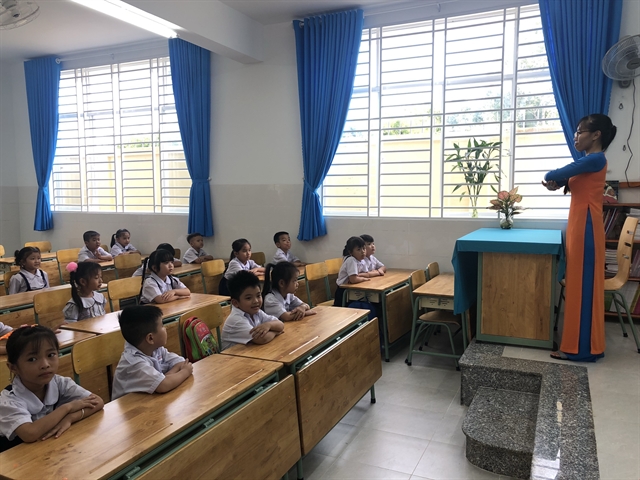 Society
Society


|
| First graders at Lê Thị Hồng Gấm Primary School in Bình Dương Province. VNA/VNS Photo Nguyễn Văn Việt |
BÌNH DƯƠNG - The number of students in the southern province of Bình Dương who passed the 2020 national high school graduation exam reached 99.48 per cent, ranking second in the country.
The province ranked fourth last year.
This year, the province had one student with the highest score of 29.8 in the B group, including tests of maths, chemistry and biology.
These achievements reflected the efforts of the province’s educational sector.
In recent years, the province has seen an increase in the number of people moving from other provinces and cities to live and work. It has ensured that all school-aged children are able to enroll in school.
In the 2020-2021 academic year, the province has nearly 508,000 students enrolled from kindergarten to high school level.
Nineteen new schools were put into use for this iacademic year, which started on September 7.
The province has 692 public and private schools and continuing education centres. Of the 380 public schools, nearly 76 per cent have met national standards as required by the Ministry of Education and Training. Schools are equipped with standard and modern teaching devices.
The province has also paid attention to improving professional knowledge of teachers for many years.
It has created a plan to develop human resources and facilities to improve educational quality in the 2020-2025 period. The province continues to co-operate with universities such as the University of Education in HCM City to open training courses for managers and teachers.
The educational sector, however, faces a shortage of teachers. In the 2020-2021 academic year, the province recruited 652 more teachers, but still lacks more than 2,300.
To resolve the shortage, the province allows schools to sign short-term contracts with other teachers or hire staff who are trained in teaching methodology but work administrative jobs.
Vocational training
The province has focused on training and developing high quality human resources, especially skilled workers who can help develop a smart city.
Vocational training in the province has improved, leading to increased quality and skilled human resources, Lê Minh Quốc Cường, head of the province’s Labour, Invalids and Social Affairs Department, told Dân Sinh online newspaper.
The province’s trained human resources rate in 2019 increased to 78 per cent. Its 100 vocational training establishments enrolled 42,942 students, reaching 110 per cent compared to the target.
In this first six months of the year, nearly 14,500 students were enrolled in vocational training, accounting for 36 per cent of the year’s plan.
The occupations attracting many students are in the fields of industrial electricity, electronics, auto technologies, accounting, pharmacy and others.
Several technical majors have a high rate of graduates who have received jobs after graduation, Cường said, adding that the rate in some schools has reached 100 per cent. Many enterprises recruit students after they finish working as interns. The new graduates’ average incomes are from VNĐ5million to VNĐ9 million (US$215-386).
The department has also improved vocational counselling for people, especially in rural areas.
In addition, it works with the Department of Education and Training to inform people about vocational training policies for ninth graders.
Vocational training school staff also visit secondary and high schools to provide counselling to students to help them choose suitable majors to study.
Cường said that many vocational training schools have strengthened co-operation with enterprises to improve training quality and ensure internships and jobs for students.
Trần Hùng Phong, rector of Việt Nam-Singapore Vocational College, said the college has invited enterprises to take part in 30 per cent of its training programme. It is alao ready to change 30 per cent to 40 per cent of its training programme according to enterprises’ needs. VNS




